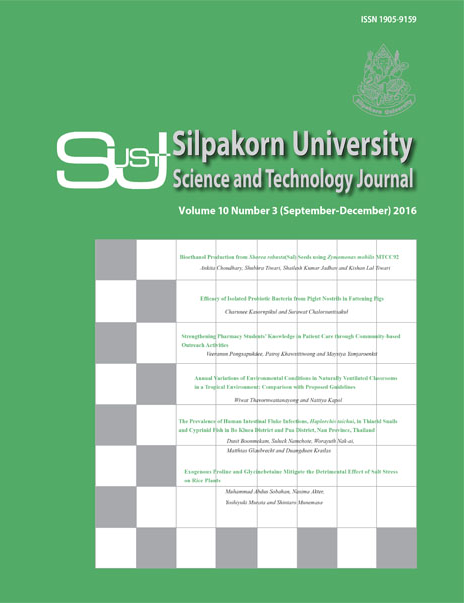Strengthening Pharmacy Students’ Knowledge in Patient Care through Community-based Outreach Activities
Main Article Content
Abstract
This quasi-experimental study aimed to design and compare outcomes of two early experiential activities through community-based learning. Seventy pharmacy students were assigned into an intervention and control group to practice at certain communities. The program in the intervention group included a 1-day brief lecture on a basic physical examination and patient interview techniques and a 10-day program of four health-related activities; home visits, health screening, health education, and case discussion. The control group practiced a 10-day routine activity of the community. The students’ knowledge and attitude, the pharmacist and the practitioners’ attitude were assessed at the end of the program. The findings revealed that both groups showed improvement in total knowledge scores but basic health care score was significantly higher in the intervention group than in the control group (p<0.01). All students were satisfied with the program and responded that their knowledge was strengthened. From the pharmacists’ viewpoint, patient care experience encouraged students to take care of others and the program helped students to understand health and drug use problems in the community. To sum up, the program was able to strengthen the patient care knowledge of students and health concern of the community. These benefits will encourage both students and communities to further solve health problems.
Downloads
Article Details
References
Ann, M. R. H., Kelli, L. C., Kimberley, J. B., and Jennifer, A.T. (2012). An advanced pharmacy practice experience in community engagement. American Journal of Pharmaceutical Education, 76(5): Article 90.
Arden, R. B., Lisa, M., Cindy, L. N., and Glen, J. P. (2012). An evaluation of teaching physical examination to pharmacists. Canadian Pharmacists Journal, 145(4):174-79e1.
Barbara, L. S. (2006). Student-directed learning in a community geriatrics advanced pharmacy practice experience. American Journal of Pharmaceutical Education, 70(3): Article 54.
Brown, M. C., Lind, P. R., and Sorensen, T. D. (2002). Early pharmacy education with community teachers (EPhECT): A longitudinal service-learning experience. American Journal of Pharmaceutical Education, 66(Winter): 443-449.
Chisholm-Burns, M. A., Kim, L. J., Spivey, C. A., Slack, M., Herrier, R. N., Hall-Lipsy, E. G., Abraham, I., Palmer, J., Martin, J. R., Kramer, S. S., and Wunz, T. (2010). US pharmacists’ effect as team members on patient care: Systematic review and meta-analyses. Medical Care, 48(10): 923-933.
David, M. R., Donald, F. B., and Lea, A. H. (1998). A three-year sequential course to enhance students’ understanding of pharmaceutical care. American Journal of Pharmaceutical Education, 62(spring): 91-93.
Denise, R. G., Kathleen, J., Luisa, C., and Sona, F. (2004). Implementing a community-based health promotion program into the pharmacy curriculum: the USC FUENTE initiative. American Journal of Pharmaceutical Education, 68(2): Article 32.
FIP Pharmacy Education Taskforce. (2010). A global competency framework: draft version 2010.[Online URL:https://www.fip.org/files/fip/ PharmacyEducation/GbCF%20booklet.pdf] accessed on March 1, 2015.
Jungnickel, P. W., Kelley, K. W., Hammer, D. P., Haines,S. T. and Marlow, K. F. (2009). Addressing competencies for the future in the professional curriculum. American Journal of Pharmaceutical Education, 73(8): Article 156.
Kaae, S., Traulsen, J. M., and Norgaard, L. S. (2012). Challenges to counseling customers at the pharmacy counter--why do they exist?. Research in Social and Administrative Pharmacy Journal, 8(3): 253-7.
Kassam, R., Poole, G., and Collins, J. (2008). Development of an instrument to assess the impact of an enhanced experiential model on pharmacy students’ learning opportunities, skills and attitudes: A retrospective comparative-experimentalist study. BMC Medical Education, 8(1): 17.
Kassam, R. and Volume-Smith, C. I. (2003). Focus group methodology to develop a community pharmaceutical care clerkship program. American Journal of Pharmaceutical Education, 67(3): 633-73.
Maitreemit, P., Pongcharoensuk, P., Kapol, N., and Armstrong, E. (2008) Pharmacist perceptions ofnew competency standards. Pharmacy Practice, 6(3): 113-120.
McGivney, M. S. (2009). Building an advanced pharmacy practice experience (APPE) site for doctor of pharmacy students. Currents in Pharmacy Teaching and Learning, 1(1): 25-32.
Miriam, A., Mobley, A., Michael, J. K., and Nicole, M. P. (2004). Enhancing student learning through integrating community-based geriatric educational outreach into ambulatory care advanced practice experimental training. American Journal of Pharmaceutical Education, 68(1): Article 20.
National Association of Pharmacy Regulatory Authorities.(2007). Professional competencies for Canadian pharmacists at entry to practice. [Online URL:https://www.ccapp-accredit.ca/site/pdfs/university/Entry_to_ Practice_Competencies_March2007_2009.pdf] accessed on March 1, 2015.
Pan American Conference on Pharmaceutical Education(CPEF) (2014). Proposal for a basic pharmaceutical education plan and professional competencies of the pharmacist.
Patterson, B. Y. (2008). An advanced pharmacy practice experience in public health. American Journal of Pharmaceutical Education, 72(5).
Pharmaceutical Society of Australia (2010). National competency standards framework for pharmacists in Australia.
Phayom, S., Siritree, S., Chanuttha, P., Juntip, K., and Usawadee, M. (2009). Health promotion integrated into a thai pharmD curriculum to improve pharmacy practice skill. American Journal of Pharmaceutical Education, 73(5): Article 78.
Pongcharoensuk, P., and Prakongpan, S. (2012). Centennial pharmacy education in Thailand. Journal of Asian Association of Schools of Pharmacy (JAASP), 1(1): 8-15.
Ryan, M., Shao, H., Yang, L., Nie, X. Y., Zhai, S. D., Shi, L. W., and Lubawy, W. C. (2008). Clinical pharmacy education in China. American Journal of Pharmaceutical Education, 72(6).
Singapore Pharmacy Council.(2011). Competency standards for pharmacists in Singapore (entry to practice). [OnlineURL: https://www.healthprofessionals.gov.sg/content/dam/hprof/spc/ docs/forms_downloads/SPC%20Competency%20Standards%20Framework%20(Feb%202011),0.pdf] accessed on March 1, 2015.
Vrahnos, D., and Maddux, M. S. (1998). Introductory clinical clerkship during the first and second professional years: Emphasis in clinical practice and writing. American Journal of Pharmaceutical Education, 62(1): 53-61.
Zeitoun, A. A., El Zein, H. L., and Zeineddine, M. M.(2014). Effect of pharmacy practiceprogram on pharmacy student learning, satisfaction, and efficiency: Assessment of Introductory Pharmacy Practice Course. Journal of Pharmacy Practice, 27(1): 89-100.


